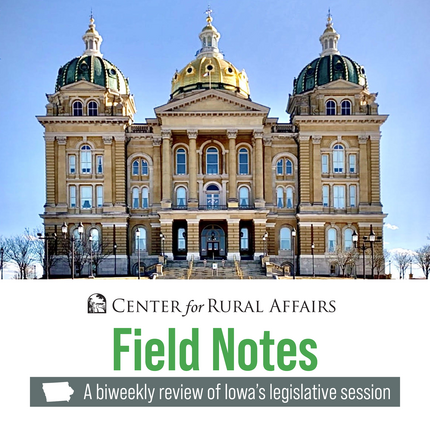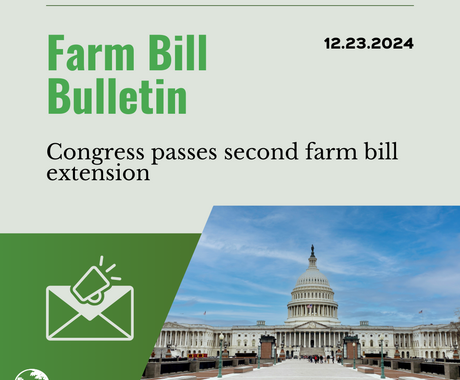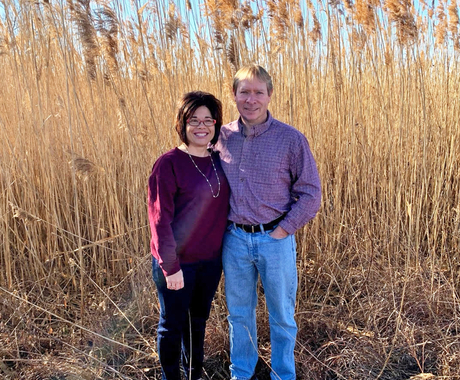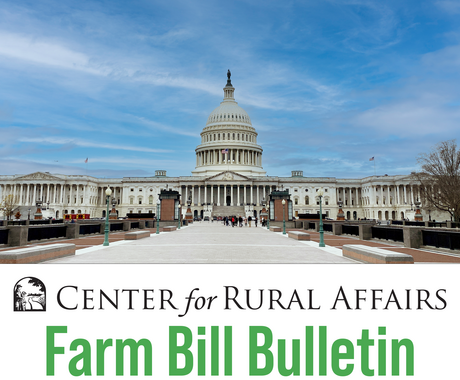As we look ahead to what could only be four weeks remaining in the 2024 Iowa legislative session, the focus turns almost solely to floor debate in both chambers.
Work for the Appropriations and Ways & Means committees continues full steam ahead this week. The Revenue Estimating Conference (REC) met on Friday, March 15. The REC is responsible for determining the state’s revenue estimates and sharing that information with decision makers regarding the impacts of the program and budget proposals. This information allows legislators to determine what programs to appropriate dollars to each legislative session.
With the second funnel deadline behind us, Center staff will continue to focus on House File (HF) 2599 and HF 2642 (formerly HF 2614). These bills, along with others connected to the Appropriations or Ways & Means committees, were not subject to the funnel deadline.
HF 2599, which would create the Grocer Reinvestment Fund and Program, remains in the House Appropriations Committee. We have connected with and prompted independent grocery store owners in Iowa to urge their legislators to support this bill. If you’d like to join this effort, we advise you to contact your local representative and members of the House Appropriations Committee and encourage them to support and fund this bill providing a tremendous opportunity for food access, especially in our rural communities.
HF 2642 (formerly HF 2614), a bill with language impacting Watershed Management Authorities (WMA), passed out of the full Appropriations Committee and is waiting on amendments before moving to the floor for debate. As currently written, the bill would place restrictions on the WMAs' ability to complete water quality work. We have been in contact with all WMAs regarding advocacy efforts. We encourage you to contact your local legislators and urge them to ensure no restrictions are placed on those completing water quality efforts in our state.
If you have any questions, or would like to share the rural issues important to you, please do not hesitate to reach out at [email protected] or 402.687.2100 ext. 1034.
Thank you for making your rural voice heard.
Below are the bills we are following, with recent updates in bold.
Rural grocery
House File (HF) 2599 — Support: Rep. Brian Lohse introduced this bill in the House, and Rep. Chad Ingels has been serving as the floor manager. This Center priority bill would create the Grocer Reinvestment Fund and Program, appropriate money from the general fund, and give the Iowa Economic Development Authority direction to create a grant program for new or current grocery stores located in areas that are both underserved and low or moderate income. The legislation would prioritize cost-saving efforts and business efficiency measures to ensure the long-term sustainability of locally owned grocery stores. Additionally, this bill includes modifications to the Iowa Code under the Local Food and Farm Program. It changes the purpose and goals of the program to include and increase the sale of local food in grocery stores. The bill now is amended to include a local produce processing grant program. Priorities will be given to entities planning to increase the availability, access, efficiency, and capacity of local foods in Iowa. The House Economic Growth and Technology Committee met on Feb. 14 and recommended passage with the amendment. The bill was renumbered and referred to the Appropriations Committee.
Watch: Rural Rapport: Heart of the Community-The Importance of Locally-Owned Grocery Stores
Water quality
HF 2642 (formerly HF 2614) — Monitor: Introduced in the House Agriculture Committee, this bill relates to the conservation and improvement of soil and water resources, including a name change to and restrictions on watershed management authorities (WMAs) in Iowa. The bill would allow soil and water conservation districts to broaden their purview by prioritizing soil health and require WMAs to spend all money for water quality nutrient reduction projects on practices designated by the Iowa Nutrient Reduction Strategy. There is not a companion bill in the Senate. The bill passed out of the House Appropriations Committee on March 6 with approval on party lines. Amendments are being suggested and will be considered on the floor for debate soon.
Renewable energy
Senate File (SF) 2356 — Support: Introduced by Chairperson Waylon Brown, this bill would establish a community solar program with all electric public utilities and set standards for billing methods. Community solar programs already exist in Iowa, but this legislation would require public utilities to provide bill credits to subscribers of an independently owned project for their share of the energy produced by the project. This bill was introduced on Feb. 13 and passed out of the full Commerce Committee on Feb. 14 and cleared the first funnel; however, it failed to pass the second and has died.
HF 2279 — Monitor: Introduced by Reps. Hans Wilz, Brian Lohse, and Sean Bagniewski previously as HSB 555, this bill offers several amendments related to public utility laws, including the elimination of a reporting requirement for the Small Wind Innovation Zone program. Most notably, however, the bill would add nuclear and electric storage units to the definition of alternate energy production facilities. This adjustment would allow public utilities to include energy storage in advanced ratemaking cases, an important step in adequately planning for future public energy projects. The bill passed out of the House Commerce Committee on Jan. 30 and was placed on the House calendar on Feb. 1. Two amendments have been filed since then, but on March 4 the bill was placed under unfinished business.
Other bills of interest
HF 2641 (formerly HF 2510)/SF 2410 (formerly SF 2209) — Support: Proposed by the Iowa Department of Agriculture and Land Stewardship, this legislation relates to programs and regulations administered by the department. The Center supports two key components of the bill. The Choose Iowa Promotional Program provides consumers an opportunity to purchase food originating in the state, which is designated with the Choose Iowa logo. This legislation also creates the Value-Added Grant Fund and Program, which supports projects and services that add value to agricultural commodities produced in Iowa. The House Appropriations Committee moved this bill forward on March 6 and the Senate Appropriations Committee moved it forward on March 11. It will see floor debate soon.
HF 2257/SF 2207 — Support: Proposed by the Iowa Department of Agriculture and Land Stewardship, this legislation proposes an amendment to the Meat and Poultry Inspection Act. The amendment would allow poultry processors to engage in custom operations if they maintain their state-licensed inspections. All packages processed on a custom basis must be marked “not for sale” and kept identified until the owner picks up the order. The House version of the bill passed unanimously through floor debate on Feb. 26. The Senate has listed this bill under unfinished business and will consider it soon for debate.
House Study Bill 722 — Monitor: Introduced by Chairperson Bobby Kaufmann on the Ways and Means Committee, this bill relates to tax credits being awarded by the Iowa Economic Development Authority for capital contributions made to the Certified Rural Business Growth Fund for investments in qualified businesses. Limits are being offered for who can receive money from the fund. It should support rural communities across the state of Iowa. A subcommittee met to discuss the bill and recommended passage on Feb. 27. It still needs to pass through the House Ways and Means Committee before being sent to the floor for debate.
SF 2400 — Monitor: Introduced by Sen. Dawn Driscoll, this bill excludes the net capital gain from the sale of breeding stock from the computation of net income for purposes of the individual income tax. The bill currently clarifies that farmers must make at least 50% of their income from that line of business to be eligible for the exemption. If eligible, it would remove the capital gains tax from selling their breeding stock. This bill was referred to Ways and Means and assigned to a subcommittee on Feb. 29. No further action has been taken.





